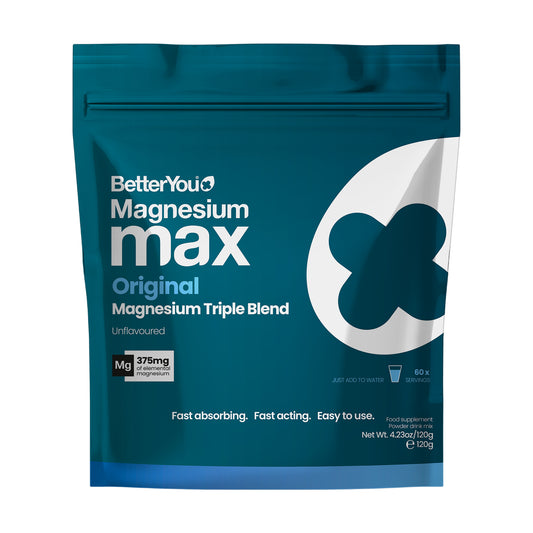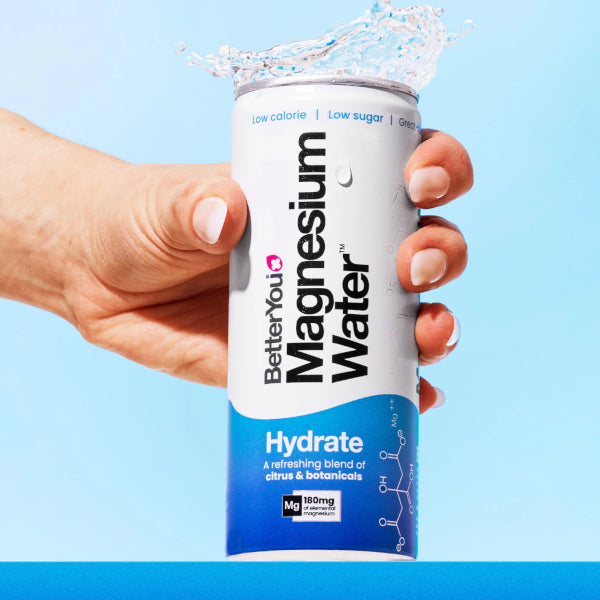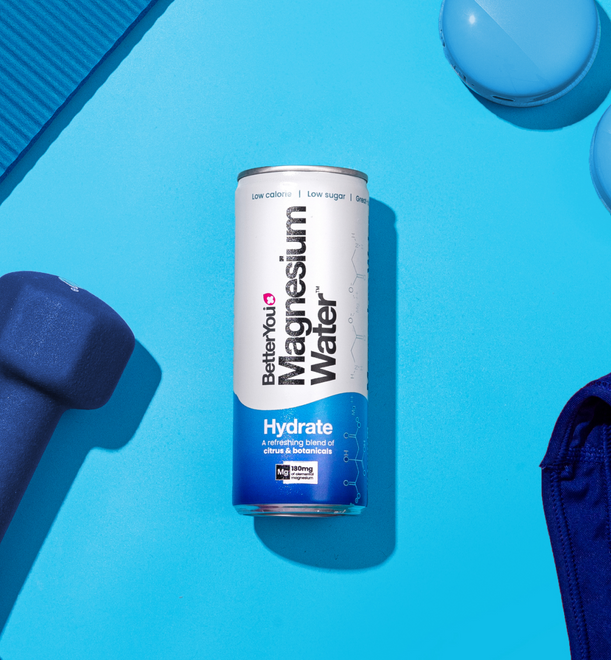Achieving the right magnesium dosage is crucial for a healthy body. A magnesium supplement could help you reach this, so you may be wondering if mineral supplements are safe. Magnesium can come from the food we eat and supplementation. We delve into the dosage requirements, and how safe they are to take.
Table of Contents:
- Recommended Magnesium Dosages
- Combat Deficiency with the Right Magnesium Dosage
- 7 Benefits of Magnesium Supplements
- How to Increase Magnesium Dosage
- Are Magnesium Supplements Safe to Take?
- Are there Side Effects of Magnesium?
Recommended Magnesium Dosages
The recommended magnesium dosage and intake changes depending on your age and sex. The table below shows the adequate intake (AI) and recommended dietary allowance (RDA) of magnesium supplements.
|
Age |
Male |
Female |
|
Birth to 6 months (AI) |
30 mg |
30 mg |
|
7–12 months (AI) |
75 mg |
75 mg |
|
1–3 years (RDA) |
80 mg |
80 mg |
|
4–8 years (RDA) |
130 mg |
130 mg |
|
9–13 years (RDA) |
240 mg |
240 mg |
|
14–18 years (RDA) |
410 mg |
360 mg |
|
19–30 years (RDA) |
400 mg |
310 mg |
|
31–50 years (RDA) |
420 mg |
320 mg |
|
51+ years (RDA) |
420 mg |
320 mg |
As we get older we are in need of a higher magnesium dosage, whilst this recommended magnesium intake peaks in the 14-18 age bracket for females, it is at its highest for males who are over the ages of 31.
Combat Deficiency with the Right Magnesium Dosage
Magnesium deficiency can cause a host of symptoms in your body, including:
- Poor Sleep - Magnesium can help you fall asleep. This means having too little a magnesium dosage could leave you struggling to nod off.
- Fatigue - Disrupted sleep can leave you feeling tired and fatigued throughout the day. Having the optimum magnesium dosage could act as a sleep aid and help you fight fatigue!
- Heart Palpitations - Helping to relax muscles, magnesium plays an important role in the function of the heart. Being deficient could leave you experiencing an irregular heartbeat.
Ensuring you have the right magnesium dosage each day could help you to avoid these signs of mineral deficiency. With the right magnesium levels, you’ll also encourage many health benefits.
7 Benefits of Magnesium Supplements
When intaking the optimum dosage of magnesium, with supplements made from magnesium chloride, you could experience these benefits:
- Boost Your magnesium dosages - Boosting your magnesium levels is one advantage of taking supplements. Each type of supplement can work to achieve the perfect magnesium dosage.
- Helps you sleep - Taken as a sleep supplement, intaking the ideal magnesium dosage could see you achieve better and more restful sleep.
- Encourages energy levels - naturally increasing your energy levels can be done with the correct magnesium intake, rather than you reaching for the energy drinks. Magnesium works as an energy supplement, alongside B12.
- Promotes muscle recovery - Relaxing the muscles, magnesium plays a major role in sports recovery. This is why taking the optimum magnesium dosage is especially vital for athletes.
- Maintains heart health - working to support the heart muscles, having the right daily intake of magnesium can help to support normal heart health.
- Improves mood - A benefit of having the right magnesium dosage is that it can improve your mood. Regulating serotonin, the ‘feel good’ hormone, means you can beat the winter blues.
- Easy to supplement - Achieving the ultimate magnesium dosage is effortless with topical supplements. With creams, bath flakes, and more made with pure Zechstein magnesium, you can easily incorporate this mineral into your daily routine.
How to Increase Magnesium Dosage
Magnesium intake is essential for keeping our bodies working properly. Increasing your daily magnesium dosage can be done through your diet and choosing the best supplements for your needs, including:
- Magnesium Sprays
- Magnesium Bath Flakes
- Magnesium Creams and Lotions
- Magnesium Oil
- Spinach
- Seeds and Nuts
- Avocado
- Milk
- Fish, like Salmon
Are Magnesium Supplements Safe to Take?
Yes, magnesium is safe to take. In fact, it’s one of seven main minerals that our bodies need in fairly large amounts to be able to function properly. Without it, we might develop a deficiency which is why it's so vital to reach your daily magnesium dosage goal.
Taking magnesium supplements is safe providing you don’t go too far over the recommended dose for your age. These recommended doses are set out below and in the table above.
If you have a medical condition, it’s always worth checking with your doctor that it’s safe to begin taking food supplements.
Is It Safe to Take Magnesium Supplements Every Day?
Yes, as long as you keep to the recommended daily dose, which is set by the Government’s Department of Health.
Adult men are recommended 300 mg each day, while adult women need around 270 mg (unless they are pregnant when the recommended dose increases to 400 mg for prenatal supplements). It is not recommended to supplement more than 400mg of magnesium daily. For children, the dosages are much lower.
It’s worth mentioning that these magnesium dosages are only for oral supplements (e.g. tablets). Transdermal magnesium applied directly to your skin, has no upper limit.
Can I Take Magnesium When Pregnant?
Yes, it is safe to take magnesium when pregnant. There’s no scientific evidence to point to any risks associated with taking magnesium as a pregnancy supplement, or later as a breastfeeding supplement. You can take supplements to support a healthy pregnancy, from conception to postnatal.
In fact, the recommended daily magnesium dosage for pregnant women increases from 375 mg to 400 mg for supplements taken by mouth. Again, with transdermal magnesium, there is no maximum intake.
Can You Take Too Much Magnesium?
At present, there’s little clinical evidence to show that taking a high intake of magnesium over a long period of time can be harmful.
There’s a chance that taking extremely high doses of magnesium could have some harmful side effects. But as long as you stick to 400 mg or less a day from oral minerals, you shouldn’t have any problems. Taking more than this isn’t recommended unless you’re under medical supervision.
If you’re healthy, you’re unlikely to take in a surplus of magnesium from food as your kidneys get rid of any excess amount in your urine.
Are there Side Effects of Magnesium?
There are some rare side effects to taking this mineral, although they are unlikely if taking the right magnesium dosage.
Joint and Muscle Pain When Supplementing
Magnesium is a natural muscle relaxant so shouldn’t cause you any pain. In fact, magnesium is one of the essential minerals for joint health. There have been cases of people feeling pain or stiffness in their joints or muscles while taking the mineral, but these are rare side effects.
As muscle pain isn’t a common side effect of high magnesium intake, it might actually be that your intake is too low.
For most people, magnesium causes no pain and helps to strengthen bones and keep muscles functioning healthily.
Can it Cause Numbness, Tingling or Itchiness?
Taking oral magnesium shouldn’t cause any numbness, tingling or itchiness in your skin. These feelings, in fact, could be a sign that you have a deficiency, particularly if they occur in your feet, hands or face.
Magnesium helps with your nervous system and nerve endings. Any deficiency in the mineral can cause nerve damage, which leads to that tingling or numb sensation.
Transdermal magnesium can cause a tingling or feeling of itchiness when first applied to the skin. However, this side effect is usually a sign of low magnesium intake and will subside as levels increase.
Magnesium & Tiredness
The right magnesium dosage is proven to improve sleep, and better sleep should leave you feeling more refreshed and energetic.
If you feel tired, this might actually suggest you aren’t getting enough magnesium—it’s very unlikely to be a side effect of the supplements themselves. Learning to increase energy naturally could help to fight this tired feeling.
Does Magnesium Cause Diarrhoea?
As magnesium can relieve muscle tension and is a natural relaxant, taking large doses orally can have a laxative effect.
Topical application doesn’t have the same effects as it absorbs through your skin rather than passing through your digestive system.
Introducing BetterYou
We innovated vitamin oral sprays and transdermal magnesium. Our range of Vitamin D supplements, children’s supplements, and iron supplements can help to support your wellbeing.


















